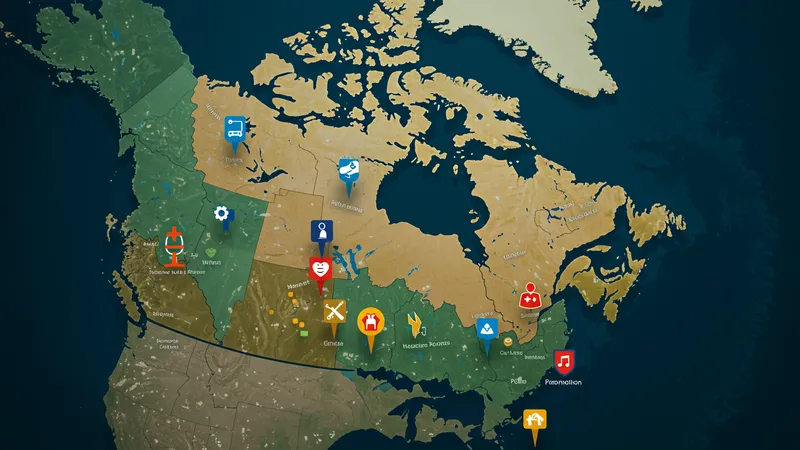Did you know that over a million people flock to the USA and Canada every year craving one thing: permanent residency? Although it's a widely desired status, most don't realize how intricate the journey really is.
As geopolitical tensions rise and economies shift, securing a foothold in North America has never been more critical. The processes, however, are cloaked in complexities that even seasoned immigrants find difficult to navigate.

Shockingly, many people are under the illusion that attaining permanent residency solely requires filling out paperwork. The truth unveils an often unpredictable process riddled with unseen hurdles. Furthermore, key elements of the process often go unnoticed, such as the significance of provincial nominations or the evolving criteria of the diversity lottery.
It might surprise you to learn that personal factors like age, language skills, and even geographic ties can drastically alter one's chances of approval. These hidden factors can pivot the outcome, yet are largely overlooked by hopeful immigrants. But that’s not even the wildest part…
Consider this: even experts in immigration law frequently face baffling ambiguities when dissecting changes in policies. What happens next shocked even the experts, redefining the landscape for millions…
The process of gaining permanent residency isn't simply a tick-the-box exercise. Your age, for example, can either be your ally or your adversary. Applicants between 18 and 35 years often have an edge, given their purported economic potential. Astoundingly, experts reveal that an older age could mean reduced chances, altering life plans completely for some.

Language proficiency is another dynamic factor that can drastically sway the trajectory of your application. Countries like Canada have set high language benchmarks to filter immigrants likely to thrive economically. But what you read next might change how you perceive language preparation forever...
Equally crucial are the geographical ties you establish before your application. Did you know that studying or working in the desired country strengthens your case significantly? These localized experiences can express commitment beyond paperwork.
And then there are the continuously revising political climates—each change ripples through immigration laws, affecting policies overnight. Far beyond mere public announcements, these shifts alter real lives. But there’s one more twist…
Believe it or not, your profession could make or break your application. Certain occupations are in high demand, giving individuals in such fields an unexpected fast track. For example, healthcare professionals and IT specialists often find doors swinging wide open.

The secret lies in ongoing labor market assessments determining which skills are most coveted. This demand-driven dynamic isn’t merely about job prospects but may catapult you from application to acceptance!
An insider tip would be to continuously seek updates into the labor market demands, offering a significant leg-up in the application race through informed decisions.
However, what happens when the demand for your profession wanes? And what do you do if you're not in one of these high-demand sectors? There's another layer to unfold...
It’s not just about geographical allegiance; some provinces or states have programs specifically designed to welcome certain skill sets or occupations. Champions of regional development, these local bodies offer another surprising pathway to permanent residency.

For instance, Canada’s Provincial Nominee Programs (PNPs) allow individual provinces to select candidates that meet their specific economic needs. This offers a unique edge for applicants who align with regional growth strategies.
But there’s a nuance: once you’ve opted into a provincial pathway, the relocation expectations could add a new layer of complexity to your next steps. Preparing for a move to a lesser-known city might soon become your reality.
The support of local governments becomes a powerful tool in navigating these options. However, the next revelation might change your approach to choosing locations altogether...
An ever-present variable in immigration is policy amendment. Sudden legislative changes can turn the tide on what was initially a promising application. Often driven by political inclination or economic needs, these amendments can generate immediate effects.

History shows us these shifts can redefine who stands a chance. For example, the tightening of policies in times of economic downturn has often meant a sudden halt to what was previously a viable immigration route.
In such climates, staying well-informed becomes as critical as the submission itself. Knowing when to pause and pivot in light of new legislature could mean the difference between success and a prolonged wait.
But before you feel disheartened, what these policies often overlook might just give you an unexpected advantage…
It may surprise many to learn that building networks within the target country can influence the success of a residency application. These relationships can provide insider knowledge or mentorship, enriching your understanding of the cultural and socio-economic landscape.

Engaging with the local community through online forums, expatriate groups, or professional associations can yield surprising benefits. Not only do they offer support, but they also enable a deeper cultural integration, showing a commitment that paperwork alone could never capture.
Networking is an asset often overlooked—not documented on forms but vital in offering a multifaceted view of the applicant’s potential impact and adaptability.
Yet, as with any strategy, challenges arise. Building authentic connections is not straightforward, presenting its own unique hurdles. But these challenges are not insurmountable…
While pursuing residency, hidden costs lurk like shadows in the paperwork maze. From applications to language tests, expenses can escalate quickly. It’s common to face financial demands that escalate beyond initial expectations.

The reality is daunting; governmental fees and professional aid can accumulate to an unmanageable sum for some. Beyond monetary strains, individuals face an emotional toll, sparking elements rarely considered, like mental preparedness.
Knowing these less discussed financial and emotional costs can offer better preparation. Whether it’s budgeting wisely or seeking emotional support avenues, awareness empowers applicants to face the process head-on.
Steeling yourself against these hidden barriers is crucial. But money isn’t the only currency in this journey, as we soon reveal how time plays an intriguing part…
Much like finances, time is often underestimated until it bears down with unanticipated pressure. Processing times are unpredictable, with sudden delays affecting your prospects significantly.

While patience is golden, uncertainty can dampen spirits as calls for updates often yield vague answers. Understanding that what was once a six-month journey might stretch to two years could recalibrate your expectations.
Many miss important opportunities hidden in these prolonged waits—such as further enhancing skills or accumulating experience. Shifting the narrative from a waiting game to growth period is a rare, advantageous insight.
Even as you turn frustration into personal progress, know that every detail of this process can provide lessons worth more than gold. But there’s another angle to explore, hidden in plain sight…
Underappreciated yet immensely powerful, volunteering offers a unique pathway to not only engage with communities but also enhance your residency profile. It signals societal contribution, strengthening your ties within the region.

Surprisingly, community service demonstrates fairness and goodwill, appealing to evaluation boards in unexpected ways. It reflects favorably on applicants, showing adaptability and commitment beyond professional qualifications.
Volunteering experiences fill pivotal gaps in language proficiency or cultural integration, rendering candidates more appealing. They also present personal growth avenues often undervalued in application checklists.
Contributions to local welfare can deliver manifold benefits. However, the strategies to deploy volunteering effectively remain an awaiting narrative to unlock…
Your online presence creates an indelible impression, whether you realize it or not. Social media profiles often serve as unofficial portfolios, reflecting personality and interests to those making crucial decisions.

Cleaning up one’s digital footprint can mean the difference between skepticism and assuredness from decision-makers poring over profiles. Presenting a well-rounded, genuine persona amplifies your narrative beyond written applications.
Community involvement, learning, and cultural awareness showcased online could offer subtle yet significant influence. Demonstrating a proactive approach and showcasing achievements online can foster a favored view.
However, with the dominance of the digital world, how you cultivate these shoals of information could be the trump card you need, and exploration into this frontier reveals astoundingly practical tips…
Behind every application lies a person with hopes and dreams. The emotional resilience to withstand this daunting process determines the success in navigating hurdles that accompany residency pursuits.

The rollercoaster of waiting, uncertainties, and sometimes rejections demands a steely resolve few are equipped for. Emotional preparedness becomes essential, providing solace when cold, procedural steps strain fragility.
Building this resilience involves more than preparing for failed attempts; it involves embracing change, staying motivated, and keeping certainty amidst chaos. Tactics range from mindfulness to creating supportive networks.
Such strategies don't just make the journey more bearable—they can define the quality of life in aspects often overshadowed by the chase. To nurture passion while advocating balance leads to effective personal resilience…
Think immigration interviews mirror ordinary question-answer sessions? Think again. Crafting your personal narrative is indispensable. Storytelling elevates basic details into memorable, impactful experiences before the adjudicator.

Taking facts from your narrative and weaving them into stories—showcasing personal growth, achievements, and setbacks—reveals more authenticity and character than mere data ever could.
Using storytelling, applicants become relatable, leaving lasting impressions. Reflecting on composite life experiences and demonstrating adaptability carries a weight that sterile accounts lack.
This artistry in expression captures attention across any cultural spectrum. But arguably foundational to the interview dynamic—it changes the paradigm of communication entirely, leaving room for a deeper revelation yet to unfold…
Having a platform to air queries, share experiences, and gather nuanced insights from those who paved the path before is invaluable. Joining groups with seasoned expats and immigration professionals offers unconventional learnings.

Engagement in these discussions can unravel problem areas, clarify doubts, and elicit unprecedented advice unavailable in formal processes. The camaraderie often found sustains hopes and imparts encouragement.
Strategic participation in these networks often presents foresight into cyclical immigration patterns and reveals subtle interpretations about policy applications evolving over time.
Staying updated on forums means receiving timely tips that are instrumental in adapting to transforming climates. The value of discourse often lies not just in knowledge— but in forming connections. The influence of collective wisdom, however, sparks considerations beyond documentation requirements...
The ever-changing fabric of immigration is woven with threads of technological advancement, policy shifts, and the impact of global events. Predicting these changes offers hope and preparation, a forward-thinking strategy fortifying immigration pursuits.

Experts foretell further digitalization of processes, simplifying yet also complicating legal maneuvers. As borders sculpt stricter or more welcoming narratives, these transformations beckon outcomes that might surprise both applicant and authority alike.
Understanding current trends and anticipating future models offers a strategic edge, indexing potential scenarios into probabilities society must interpret and prepare for.
Finalizing this near-future forecast solidifies the dialogue surrounding immigration's adaptability. And while the technical outlook paves the road for flourishing endeavors, it ignites personal expectations. Immigrants and hopefuls must learn to embrace the extraordinary duality these anticipations present…
The journey through unrelenting challenges of obtaining permanent residency imparts life-altering lessons that extend well beyond acquiring a new home. Understanding every facet, from hidden costs to emotional strategies, makes navigating complex landscapes more manageable.
Now’s the time: whether by sharing insights with others or by reevaluating personal goals, your actions today can ripple toward broader horizons. Bookmark this guide, share it, and become part of the change—because every moment is an opportunity to shape yours and others’ destiny. Your future awaits, and how you choose to shape it is the real story…